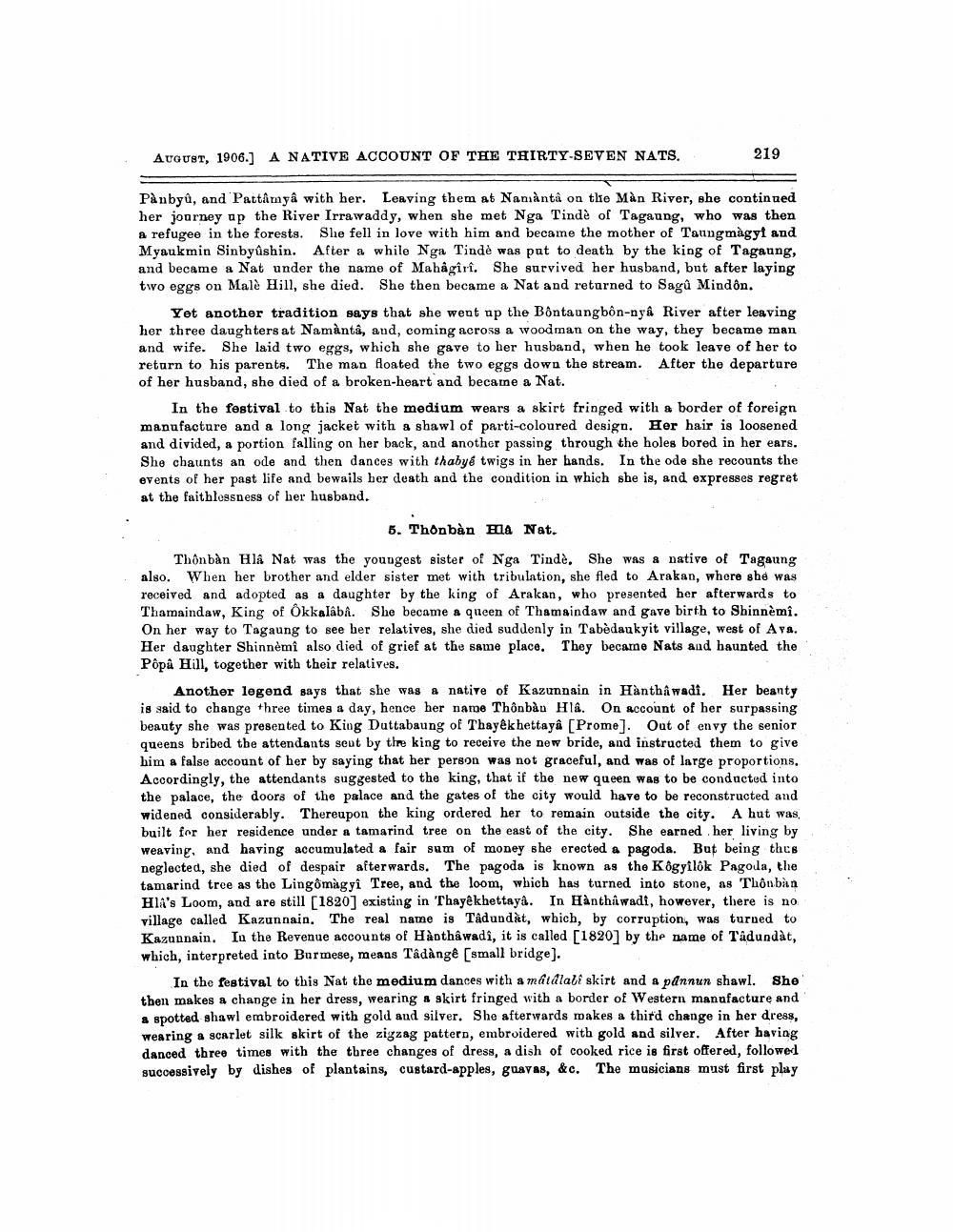________________
AUGUST, 1906.) A NATIVE ACCOUNT OF THE THIRTY-SEVEN NATS.
219
Pånbyû, and Pattâmga with her. Leaving them at Nanàntâ on the Màn River, she continued her journey up the River Irrawaddy, when she met Nga Tindè of Tagaung, who was then a refugee in the forests. She fell in love with him and became the mother of Taungmagyi and Myaukmin Sinbyûshin. After a while Nga Tindè was pat to death by the king of Tagaung, and became a Nat under the name of Mahagiri. She survived her husband, but after laying two eggs on Malè Hill, she died. She then became a Nat and returned to Sagû Mindôn.
Yet another tradition says that she went up the Bóntaungbôn-nya River after leaving her three daughters at Namàntâ, and, coming across a woodman on the way, they became man and wife. She laid two eggs, which she gave to her husband, when he took leave of her to return to his parents. The man floated the two eggs down the stream. After the departure of her husband, she died of a broken-heart and became a Nat.
In the festival to this Nat the medium wears a skirt fringed with a border of foreign manufacture and a long jacket with a shawl of parti-coloured design. Her hair is loosened and divided, a portion falling on her back, and another passing through the holes bored in her ears. She chaunts an ode and then dances with thabye twigs in her hands. In the ode she recounts the events of her past life and bewails her death and the condition in which she is, and expresses regret at the faithlessness of her husband.
5. Thonbàn HLA Nat.
Thôn bàn Há Nat was the youngest sister of Nga Tinde. She was a native of Tagaung also. When her brother and elder sister met with tribulation, she fled to Arakan, where she was received and adopted as a daughter by the king of Arakan, who presented her afterwards to Thamaindaw, King of Okkalaba. She became a queen of Thamaindaw and gave birth to Shinnemi. On her way to Tagaung to see her relatives, she died suddenly in Tabèdaukyit village, west of Ara. Her daughter Shinnémi also died of grief at the same place. They became Nats and haunted the Pôpå Hill, together with their relatives.
Another legend says that she was a native of Kazunnain in Hanthawadi. Her beanty is said to change three times a day, hence her name Thônbào Hlá. On account of her surpassing beauty she was presented to King Duttabaung of Thayêk hettaya [Prome]. Out of envy the senior queens bribed the attendants sent by the king to receive the new bride, and instructed them to give him a false account of her by saying that her person was not graceful, and was of large proportions, Accordingly, the attendants suggested to the king, that if the new queen was to be conducted into the palace, the doors of the palace and the gates of the city would have to be reconstructed and widened considerably. Thereupon the king ordered her to remain outside the city. A hut was, built for her residence under a tamarind tree on the east of the city. She earned her living by weaving, and having accumulated a fair sum of money she erected a pagoda. But being the neglected, she died of despair afterwards. The pagoda is known as the Kôgyilok Pagoda, the tamarind tree as the Lingồmagyî Tree, and the loom, which has turned into stone, as Thônban Hla's Loom, and are still [1820] existing in Thayêkhettaya. In Hànthawadi, however, there is no village called Kazunnain. The real name is Tâdundàt, which, by corruption, was turned to Kazunnain. In the Revenue accounts of Hàothâwadi, it is called [1820] by the name of Tadundát, which, interpreted into Burmese, means Tadàngê [small bridge).
In the festival to this Nat the medium dances with a matalali skirt and a pannun shawl. She then makes a change in her dress, wearing a skirt fringed with a border of Western manufacture and a spotted shawl embroidered with gold and silver. She afterwards makes a third change in her dress, wearing a scarlet silk skirt of the zigzag pattern, embroidered with gold and silver. After having danced three times with the three changes of dress, a dish of cooked rice is first offered, followed successively by dishes of plantains, custard-apples, guavas, &c. The musicians must first play




